What school? There’s still time to enjoy safe summer fun
Special Advertorial Health Section

School vacations are almost over, but there is still time to enjoy some summer fun with your family. Weekend getaways, days at the beach, and long lazy days by a pool can be entertaining for the kids, and hopefully relaxing for mom and dad. But such laid-back summer activities aren’t without their risks, so parents and others must be vigilant about keeping young children safe.
“Summer is spent enjoying the outdoors and spending time with family,” said Lisa Allee, injury prevention coordinator at Boston Medical Center (BMC). “But we frequently see a rise in preventable injuries because people too often let their guard down when they need to be thinking about safety first.”
According to the Centers for Disease Control and Prevention (CDC), children and young teens account for almost 60 percent of all bicycle-related injuries seen in U.S. emergency departments; 55 percent of those crashes happen as a child is riding out of their own driveway. “In Massachusetts, the law requires any person age 16 or younger to wear a helmet, but we encourage older teens and adults to wear helmets as well to set an example for young children,” said Allee. “And at BMC, we are committed to ensuring the protection of every child in the Commonwealth by teaming up with the Boston Public Health Commission and the Play Safe Campaign to provide low-cost bicycle helmets to Boston residents”.
For those preparing for a fall race or teens who may be gearing up for a high school team’s preseason, running in summertime heat is unavoidable, but you can be prepared.
“It’s important to listen to your body,” said Lauren Nentwich, MD, emergency medicine physician at BMC. “When your body is telling you it’s had enough, take a break in the shade and drink some water.”
Nentwich says every runner and athlete should know the warning signs of heat exhaustion and heat stroke. “Those experiencing heat exhaustion have a body temperature around 101 to 103 degrees. They are often dehydrated and feel like they can’t run, but their mind is clear. Heat stroke is much more severe. People often have a body temperature higher than 103 degrees and are very confused and may even stop sweating. This is when it becomes a true emergency, and you have to get the person cooled down as soon as possible.”
Nentwich suggests taking a cold bottle of water with you on every outdoor adventure. If you begin experiencing symptoms of heat exhaustion, try soaking in a cold bath as soon as you get home. If you’re symptoms persist or your fever spikes, call your doctor immediately.
A dip in the pool is also a great way to cool down, but even a pool can be dangerous for small children. Be sure to buy swim aids, arm floats or life jackets that are U.S. Coast Guard approved. Adults should always accompany children in the pool, and when not in use, pools should be properly secured with a locked gate and pool cover.
If you’re heading to the ocean or bay, check the local beach forecast for rip current warnings before you leave the house. According to the National Weather Service, 100 people drown every year in the U.S. due to rip currents, making it the leading surf hazard for all beachgoers.
“If you do get caught in a rip current you want to swim parallel to the shore until you are no longer in it. At that point, you can turn towards the shore and swim in,” said Allee. “And remember to only swim at beaches that have a lifeguard on duty.”
Skin protection also is a must. “You want to buy a sunscreen that has SPF 30 or above and has the term ‘broad spectrum’ on its label meaning it protects against UVA and UVB rays,” said Debjani Sahni, MD, director of BMC’s skin cancer program. “Sunscreen should be used generously and reapplied every couple of hours. Also, there is no such thing as a fully-waterproof sunscreen, so you should use ones that say ‘water-resistant’ which protect for a specific amount of time as indicated on the bottle, and reapply every time you get out of the water.”
As a community, it is everyone’s responsibility to look out for one another during periods of extreme heat. Be sure to check on your elderly neighbors who may be home-bound and share these tips with your loved ones.






